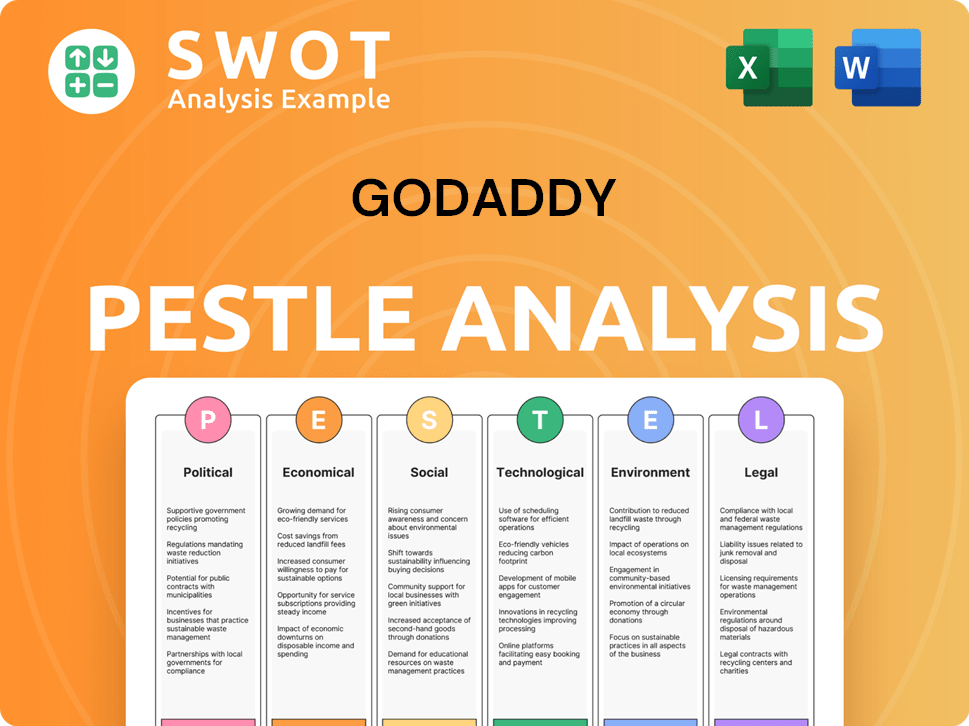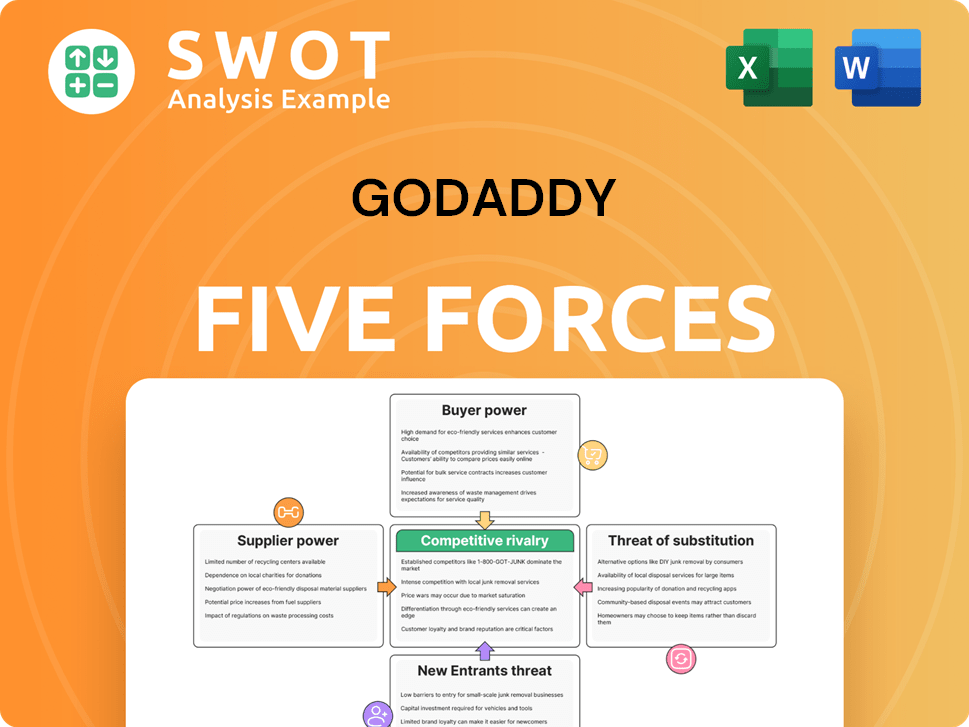GoDaddy Bundle
How Does GoDaddy Dominate the Digital Domain?
GoDaddy, a titan of the internet, has transformed from a simple domain registrar into a comprehensive digital platform. But in a market teeming with rivals, how does GoDaddy truly stack up? This analysis dives into the GoDaddy SWOT Analysis, exploring its position, key competitors, and the strategies that fuel its continued success.

Understanding the GoDaddy competitive landscape is crucial for anyone navigating the digital realm. This deep dive provides a comprehensive GoDaddy market analysis, examining its business model and how it contends with web hosting providers and other domain registration services. We'll explore GoDaddy's strengths and weaknesses, and its key rivals in the domain industry.
Where Does GoDaddy’ Stand in the Current Market?
The core operations of GoDaddy revolve around providing a suite of services designed to help individuals and small to medium-sized businesses (SMBs) establish and manage their online presence. This includes domain registration, web hosting, website building tools, e-commerce solutions, and online marketing services. The company aims to be a one-stop shop, simplifying the process of getting online and growing a business.
GoDaddy's value proposition centers on offering accessible and user-friendly tools, coupled with robust support, to empower entrepreneurs and SMBs. They provide a comprehensive ecosystem that allows customers to manage all aspects of their online presence from a single platform. This integrated approach simplifies operations and reduces the need to juggle multiple providers.
GoDaddy holds a significant market position, particularly in domain registration. As of early 2024, they manage over 84 million domain names globally. This extensive reach underscores their dominance in the domain registration market, making them a key player in the GoDaddy competitive landscape.
GoDaddy primarily serves SMBs and individual entrepreneurs. They provide tools and services tailored to the needs of these customers, helping them build and manage their online presence. With 21 million customers worldwide, GoDaddy's focus on SMBs is a cornerstone of its GoDaddy business model.
GoDaddy offers a broad range of services, including domain registration, web hosting, website builders, e-commerce solutions, and marketing tools. This diverse portfolio enables GoDaddy to capture a larger share of the SMB market. The expansion into various services is a key aspect of their strategy to compete with other web hosting providers.
GoDaddy's financial health reflects its strong market position. For the fiscal year 2023, GoDaddy reported total revenue of $4.2 billion, demonstrating a 6.7% year-over-year growth. This financial performance highlights its success in the GoDaddy market analysis.
GoDaddy's strategic shift towards becoming a comprehensive 'one-stop shop' has allowed it to capture a larger share of the SMB market. This diversification, along with a strong global presence, particularly in North America and emerging markets, supports its market leadership. To understand how GoDaddy came to dominate the market, reading a Brief History of GoDaddy can be helpful.
- Domain Registration Services: GoDaddy's dominance in domain registration is a key factor in its market position.
- Web Hosting and Website Builders: Offering these services expands its reach and caters to a broader customer base.
- E-commerce Solutions and Marketing Tools: These features help SMBs manage their online presence effectively.
- Global Presence: Strong positions in North America and emerging markets contribute to overall market share.
GoDaddy SWOT Analysis
- Complete SWOT Breakdown
- Fully Customizable
- Editable in Excel & Word
- Professional Formatting
- Investor-Ready Format

Who Are the Main Competitors Challenging GoDaddy?
The GoDaddy competitive landscape is characterized by a diverse array of competitors, both direct and indirect, vying for market share in the domain registration, web hosting, and related services sectors. Understanding the dynamics of these competitors is crucial for assessing GoDaddy's market analysis and strategic positioning. The competitive environment is shaped by pricing strategies, service offerings, customer acquisition tactics, and technological advancements, making it essential to stay informed about the latest developments.
GoDaddy's business model faces challenges from both established players and emerging platforms. The company must continuously adapt to maintain its competitive edge and capture a significant portion of the market. This includes responding to competitive pricing, enhancing service offerings, and innovating to meet the evolving needs of its customer base. The competitive landscape is constantly changing.
GoDaddy's market share analysis 2024 shows a need to understand the strengths and weaknesses of its competitors. This understanding can help GoDaddy improve its own offerings and refine its strategies. This is particularly important in the context of the company's financial performance analysis and customer acquisition strategies.
Direct competitors include Endurance International Group (EIG) brands, Namecheap, and IONOS. EIG, with brands like Bluehost and HostGator, often competes on price and bundled offerings.
Indirect competitors include website builders like Squarespace and Wix, which offer all-in-one solutions. Cloud providers like AWS and Google Cloud also indirectly compete by offering hosting services.
EIG's diverse portfolio, including Bluehost and HostGator, enables it to compete across various price points and service tiers. They often offer bundled packages.
Namecheap is known for its competitive pricing on domain registrations and a strong focus on customer privacy. They are a strong contender in the domain registration services market.
IONOS by 1&1, a European powerhouse, competes with comprehensive web presence solutions. They have a strong presence in European markets.
Squarespace and Wix offer user-friendly website builders. These platforms appeal to users seeking integrated design and e-commerce functionalities.
The competitive landscape also involves mergers and acquisitions, such as Constant Contact's acquisition of SharpSpring in 2021, which enhanced its marketing automation capabilities. The strategies employed by GoDaddy's competitors, including their GoDaddy's pricing strategies compared and GoDaddy's domain renewal pricing, influence the market dynamics. For example, the GoDaddy vs Namecheap comparison often highlights pricing differences and service features. To understand GoDaddy's strengths and weaknesses, it's helpful to analyze its performance relative to these competitors. For more details on the strategies, consider reading about the Marketing Strategy of GoDaddy.
Several factors shape the competitive landscape, including pricing, service offerings, customer service, and technological innovation. Understanding these factors is crucial for GoDaddy's international market presence and overall success.
- Pricing: Competitive pricing is a key factor, with many competitors offering aggressive introductory rates and bundled packages.
- Service Offerings: The breadth and depth of services, including domain registration, web hosting, website builders, and e-commerce tools, are crucial.
- Customer Service: The quality of customer support, including availability and responsiveness, significantly impacts customer satisfaction and loyalty.
- Technology: The adoption of new technologies, such as cloud infrastructure and AI-driven tools, influences competitiveness.
GoDaddy PESTLE Analysis
- Covers All 6 PESTLE Categories
- No Research Needed – Save Hours of Work
- Built by Experts, Trusted by Consultants
- Instant Download, Ready to Use
- 100% Editable, Fully Customizable

What Gives GoDaddy a Competitive Edge Over Its Rivals?
Analyzing the Growth Strategy of GoDaddy involves understanding its competitive advantages. These advantages are crucial for maintaining its leading position in the domain registration services and web hosting providers market. The company's success is built on a foundation of scale, integrated services, and customer-focused support.
One of the most significant strengths is its brand recognition and market presence. As the world's largest domain registrar, it benefits from extensive brand equity, which fosters customer trust and loyalty. This scale also enables competitive pricing. The company has consistently leveraged these advantages in its marketing and product development strategies, reinforcing its market leadership.
Another key advantage is its comprehensive suite of integrated services. It has evolved from a domain registrar to a holistic provider of online presence solutions, including website builders, marketing tools, email services, and security features. This 'one-stop shop' approach simplifies the process for individuals and small businesses, reducing the need for multiple vendors and offering a streamlined user experience.
GoDaddy's immense scale provides significant advantages in the competitive landscape. Its strong brand recognition fosters customer trust and loyalty. This scale also translates into cost efficiencies, allowing for competitive pricing.
The company offers a wide array of integrated services beyond domain registration. This 'one-stop shop' approach simplifies online presence management for customers. Services include website builders, marketing tools, and email services.
GoDaddy provides extensive customer support infrastructure, including 24/7 availability. This commitment enhances customer satisfaction and retention. The company's focus on customer service is a key differentiator.
GoDaddy invests in proprietary technologies to improve its platform's performance and user-friendliness. This includes constant updates to its website builder and e-commerce functionalities. The company continues to innovate to meet evolving customer needs.
GoDaddy's competitive advantages are multifaceted, contributing to its success in the market. These advantages include brand recognition, a comprehensive suite of services, and strong customer support. The company's focus on technological innovation further enhances its position.
- Market Share: GoDaddy holds a significant market share in domain registration and web hosting.
- Customer Base: The company serves millions of customers worldwide, from individuals to small businesses.
- Revenue: GoDaddy generates substantial revenue through its diverse service offerings.
- Innovation: The company consistently updates its platform to meet evolving customer needs.
GoDaddy Business Model Canvas
- Complete 9-Block Business Model Canvas
- Effortlessly Communicate Your Business Strategy
- Investor-Ready BMC Format
- 100% Editable and Customizable
- Clear and Structured Layout

What Industry Trends Are Reshaping GoDaddy’s Competitive Landscape?
Analyzing the Target Market of GoDaddy, understanding its competitive landscape is crucial for evaluating its future. The web hosting and domain industry is dynamic, influenced by technological advancements, evolving customer needs, and intense competition. This analysis examines industry trends, potential challenges, and promising opportunities for GoDaddy, providing a comprehensive GoDaddy market analysis.
The competitive landscape for GoDaddy is complex, involving a mix of established players and emerging competitors. The company's ability to adapt to these changes will significantly impact its market position and future success. Understanding the nuances of GoDaddy's business model and how it competes is essential for any stakeholder.
Key industry trends include a growing demand for integrated, user-friendly solutions, especially from small businesses. Cybersecurity and data privacy are increasingly important, and AI is offering new opportunities for website design and marketing. These trends shape how GoDaddy and its competitors operate in the domain registration services and web hosting providers sectors.
GoDaddy faces challenges in maintaining market share against specialized competitors and larger tech companies. Pricing pressure due to commoditization of basic services and the need to stay ahead of cybersecurity threats are also critical. These challenges require strategic responses to ensure GoDaddy's continued success.
Opportunities for GoDaddy include expanding managed services, leveraging AI for personalized tools, and penetrating emerging markets. Strategic partnerships can also unlock new growth avenues. These opportunities require proactive strategies to capitalize on market dynamics.
GoDaddy's competitive position is evolving towards a service-centric model, focusing on value-added solutions and customer success. This shift is crucial for resilience and future growth. Understanding GoDaddy's competitive landscape is key to making informed decisions.
GoDaddy's main rivals in the domain industry and top web hosting alternatives to GoDaddy include companies like Namecheap, Wix, and Squarespace. GoDaddy's strengths and weaknesses are often compared against these competitors. For instance, a GoDaddy vs Namecheap comparison often highlights pricing and features.
- GoDaddy's market share analysis 2024 shows its continued dominance, but faces increasing competition.
- GoDaddy's customer acquisition strategies involve a mix of marketing and partnerships.
- GoDaddy's domain renewal pricing and website builder competitors influence customer decisions.
- GoDaddy's customer service reviews and SEO tools compared are important for customer satisfaction.
GoDaddy Porter's Five Forces Analysis
- Covers All 5 Competitive Forces in Detail
- Structured for Consultants, Students, and Founders
- 100% Editable in Microsoft Word & Excel
- Instant Digital Download – Use Immediately
- Compatible with Mac & PC – Fully Unlocked

Related Blogs
- What are Mission Vision & Core Values of GoDaddy Company?
- What is Growth Strategy and Future Prospects of GoDaddy Company?
- How Does GoDaddy Company Work?
- What is Sales and Marketing Strategy of GoDaddy Company?
- What is Brief History of GoDaddy Company?
- Who Owns GoDaddy Company?
- What is Customer Demographics and Target Market of GoDaddy Company?
Disclaimer
All information, articles, and product details provided on this website are for general informational and educational purposes only. We do not claim any ownership over, nor do we intend to infringe upon, any trademarks, copyrights, logos, brand names, or other intellectual property mentioned or depicted on this site. Such intellectual property remains the property of its respective owners, and any references here are made solely for identification or informational purposes, without implying any affiliation, endorsement, or partnership.
We make no representations or warranties, express or implied, regarding the accuracy, completeness, or suitability of any content or products presented. Nothing on this website should be construed as legal, tax, investment, financial, medical, or other professional advice. In addition, no part of this site—including articles or product references—constitutes a solicitation, recommendation, endorsement, advertisement, or offer to buy or sell any securities, franchises, or other financial instruments, particularly in jurisdictions where such activity would be unlawful.
All content is of a general nature and may not address the specific circumstances of any individual or entity. It is not a substitute for professional advice or services. Any actions you take based on the information provided here are strictly at your own risk. You accept full responsibility for any decisions or outcomes arising from your use of this website and agree to release us from any liability in connection with your use of, or reliance upon, the content or products found herein.